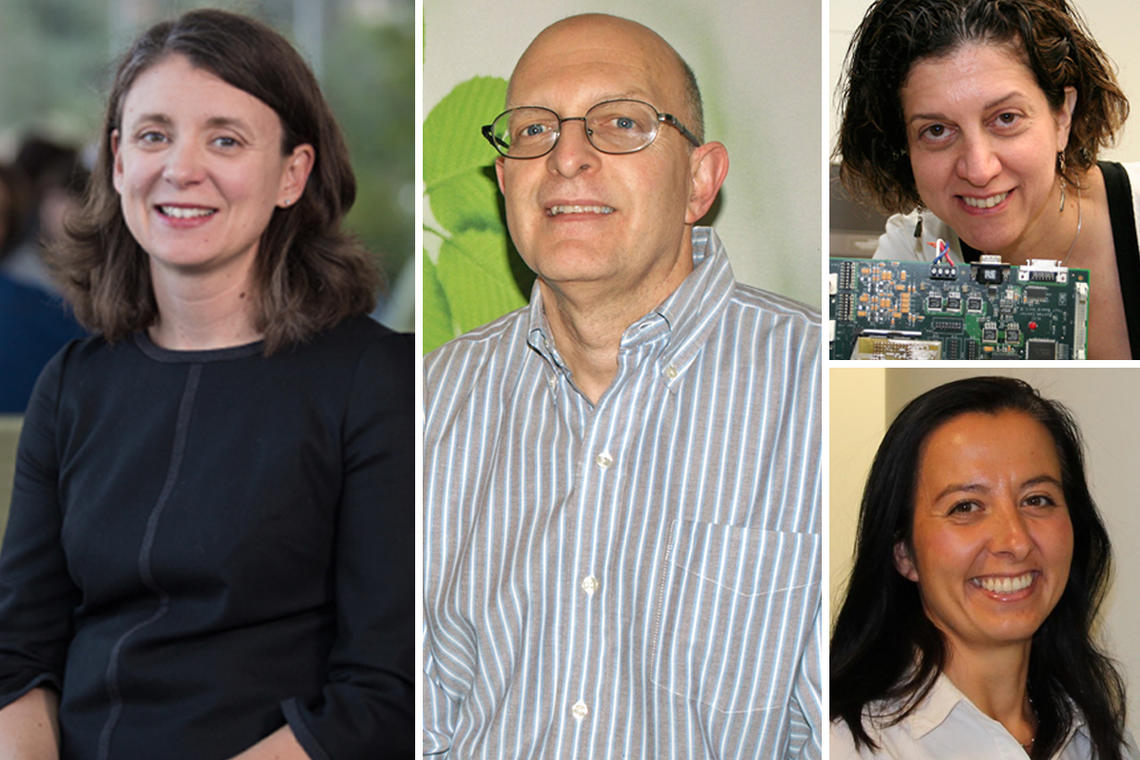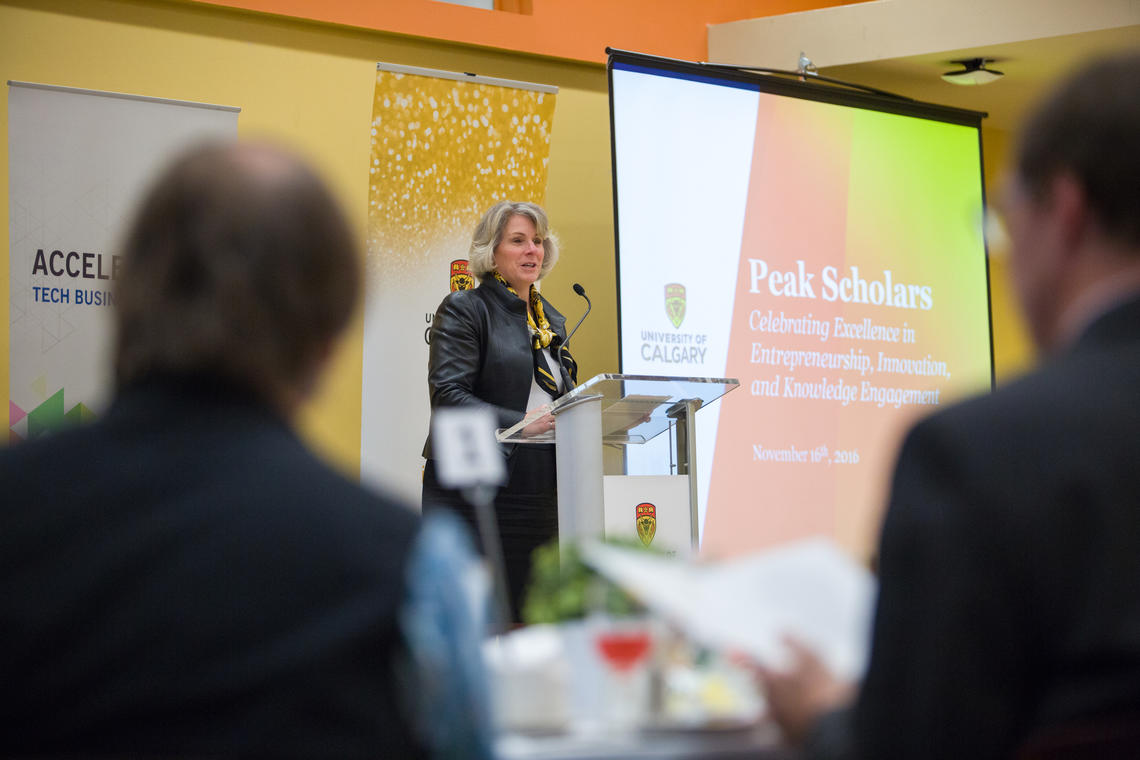Nov. 25, 2016
Peak Scholars bring groundbreaking research to the communities that need it

Mary O’Brien, David Nicholas, Orly Yadid-Pech, and Beata Mickiewicz were some of the Peak Scholars.
A group of University of Calgary researchers were celebrated last week for their commitment to connecting leading-edge research with the individuals and communities that need it. At the Peak Scholars in Entrepreneurship, Innovation, and Knowledge Engagement luncheon, President Elizabeth Cannon and Innovate Calgary CEO Peter Garrett recognized over 60 scholars for their achievements.
The annual event recognizes scholars whose academic work has had a positive social or economic impact outside of the academy. Scholars are nominated by their deans for projects that demonstrate community or knowledge engagement, entrepreneurship, tech transfer, innovation, or collaborative research. This year, 23 scholars were nominated and welcomed to the Peak Scholars community.
“The University of Calgary is known for its creativity, entrepreneurial spirit and commitment to helping others,” says Cannon. “Most importantly, we’re known for our people — the extraordinary scholars recognized who have made so much of our university’s success possible. These visionaries inspire all of us with their courage and their dedication to do what they can to leave the world a better place.”
For this year’s celebration, the university partnered with Innovate Calgary to recognize an additional 42 scholars who have had patents issued in the past four years. “It is important to recognize those who contribute to the transfer of research into real-world applications,” says Garrett. “Entrepreneurial scholars drive the innovation ecosystem which in turn contributes to the economy.”
The Peak Scholars program was developed in 2014 to recognize researchers who bridge the gap between discovery and innovation. The genesis of the program was the development of two of the university’s Research Platforms: Commercialization and Knowledge Translation. These platforms support and accelerate research with an entrepreneurial or community-minded focus.
This year’s Peak Scholars join the 2014 and 2015 cohorts, expanding a community of researchers who will serve as ambassadors to promote entrepreneurial thinking and knowledge engagement across campus.
Below are some examples of the community-oriented research being done by this year’s cohort of nominated Peak Scholars and patent holders.
Engaging language expertise to support multilingualism
Mary O’Brien, associate professor in the School of Languages, Linguistics, Literatures and Cultures, focuses on second language acquisition, specifically on how languages are perceived and produced, and how they are taught and learned. In her work with the community and with the Calgary Board of Education, she focuses on supporting language learners, teachers, and members of the community at large in an increasingly multilingual world.

University president Elizabeth Cannon speaks at the Peak Scholars luncheon.
Riley Brandt, University of Calgary
Advancing employment opportunity and support to those with autism spectrum disorder
David Nicholas, associate professor in the Faculty of Social Work, has received international acclaim for his work addressing Autism Spectrum Disorder at the Vocational Abilities Innovation Lab. His research program is based on the development of approaches related to employment opportunities, training curriculum for employment support personnel, and community service for those with autism and other development disabilities. The lab aims to advance national and international practices to create inclusive work spaces and opportunity for persons with developmental disability.
Alternative light sources for spectrometer technology
Orly Yadid-Pecht, professor in the Schulich School of Engineering, has been involved with entrepreneurship and intellectual property creation for the last two decades. This year, her group completed an Alberta Enterprise and Advanced Education (EAE) project in partnership with Luxmux Technology Inc. Her group worked on an alternative light source for Luxmux Technology’s proprietary spectrometer technology. The first solution offered, a supercontinuum fiber-based light source, was developed with postdoctoral scholar Yuhua Li and graduate student Yuting He. The second solution, based on Superluminecent Diodes (SLEDs), was developed together with a third-party company in the United States. The latter solution was further developed, and currently serves as the basis of one of Luxmux Technology’s product offerings.
Biomarkers for diagnosis and prognosis of paediatric septic shock
Beata Mickiewicz, research associate in the Bio-NMR Centre, is motivated by a desire to better understand metabolic response to diseases, and to uncover potential applications of metabolomics for improving disease diagnosis, treatment and prognosis. Along with Hans J. Vogel, Brent Winston, and Hector Wong, Mickiewicz holds a patent for “metabolite biomarkers for diagnosis and prognosis of pediatric septic shock.” Sepsis can be deadly for critically ill patients, and it has been estimated that mortality rate of sepsis is much higher than the mortality rate resulting from HIV/AIDS, prostate cancer and breast cancer combined. Detecting sepsis at an early stage and rapid initiation of appropriate treatment is crucial, and can have a significant impact on patient’s outcome.
Find a full list of the 2016 Peak Scholars on the website.
UCalgary’s Strategic Research Plan is part of the roadmap toward our Eyes High vision of becoming one of Canada’s top research universities. To achieve this goal, we are focused on three major priorities: matching our strengths with opportunities, increasing our research capacity, and creating a dynamic environment to promote research excellence. Learn more about the Strategic Research Themes and Platforms that provide the framework through which we are achieving our goals.
Innovate Calgary is the technology-transfer and business-incubation centre for the University of Calgary, working with the Office of the Vice-President (Research) to help bridge the gap between discovery and innovation. From ideation to commercialization, Innovate Calgary has successfully supported the innovation-driven community for 35 years.
